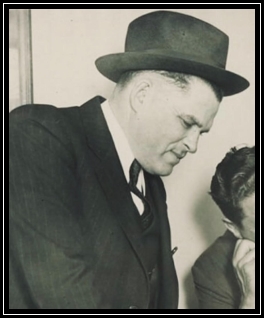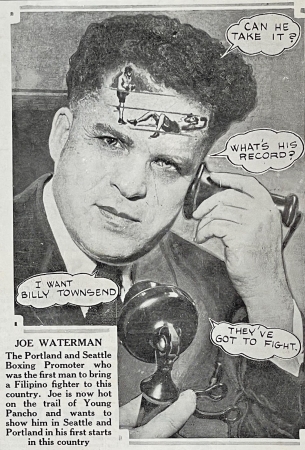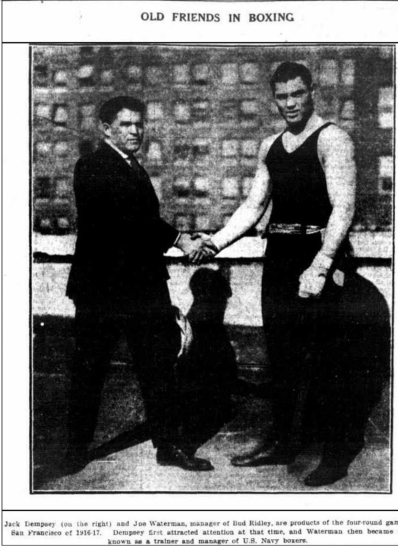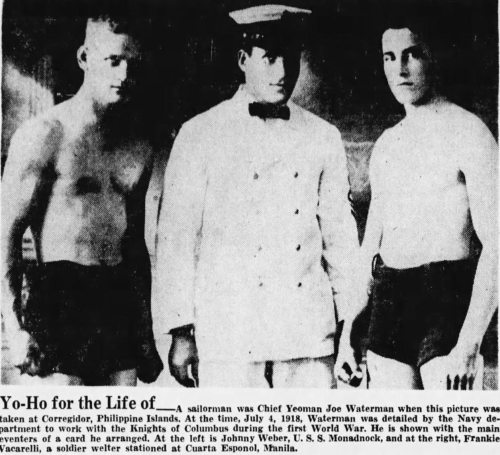
|
Philippines, 23 Feb 2026 |
Home >> News |
 |
||||
|
|
|
|
Joe Waterman and his pioneering influence on Philippine Boxing By Emmanuel Rivera, RRT PhilBoxing.com Thu, 25 Jan 2024  If not for astute promoters, we would not have the great sport of boxing. Envisioning an event, organizing the card, and making the fights happen required a specific skill set, and no one did it better than Joe Waterman. He was modern boxing’s Renaissance man, having traveled the seven seas as a sailor, fighter, and later as the most significant supporter of the Sweet Science of Bruising, donning various roles such as a writer, referee, matchmaker, and promoter. After establishing himself as the foremost advocate for boxing in the Philippines during the 1910s and twenties, Joe Waterman revitalized the Los Angeles fight scene, starting at the boxing mecca Olympic Auditorium in Los Angeles. His astute eye for talent played an indispensable role in shaping the sport's trajectory on the West Coast and beyond. While stationed and promoting fights in Subic Bay along with US Marine Edward Gallaher in Olongapo, Philippines, Waterman helped develop ‘The Australian Scoring System’— a more fair scoring method—wherein a single referee or a scoring referee and two judges are used— allotting up to a total of eleven points per round based on in-ring action. In contrast to other systems, it avoided even rounds, ensuring one boxer received more points. So, in a ten-round decision bout, the total points reached 110. To secure a verdict from the referee or scoring officials, one needed to win by at least three points, differing from most systems allowing victory by just one point. A knockdown earned five points, and fouls incurred a maximum penalty of two points. It was implemented in California rings around 1925 to 1956.  (Photo Credit: THE KNOCKOUT, Published Weekly, Vol. 5, August 6, 1932) Waterman's influence permeated Boxiana, applying his matchmaking skills to nurture new talent and curate alluring boxing cards. In the backdrop of the Great Depression, staging boxing events at the Olympic Auditorium was a formidable task until Joe Waterman assumed the role of matchmaker in September 1935. Recognizing the financial constraints, Waterman strategically lowered ticket prices, making the sport more affordable. The gate for a full house drastically decreased from the 1920s box office take of $18,800 to $5,200– general admission was priced at twenty-five cents, much less than the previous dollar. The great Henry Armstrong, then a professional boxer struggling with modest purses, experienced a significant boost as Waterman featured him as the headliner in several events. By the end of 1936, Waterman's efforts were reflected in the remarkable attendance of over 400,000, establishing the Olympic Auditorium as the leading boxing venue.  Photo Credit: Referee: Sydney, NSW: 1886 - 1939), May 3, 1922, page 11 (Courtesy of the National Library of Australia) In one way or another, Mr. Waterman helped launched the careers of great Filipino boxers— like Eustaquio Duarte, Francisco Labra, Silvino Jamito, Gaudencio Cabanela, Inocencio Moldez, the Flores brothers (Macario, Francisco, Ireneo and Elino), Francisco Guilledo, Benjamin Gan, Eleuterio Zapanta, Ceferino Garcia and the brothers Docusen— Regino, Maxie and Bernard. The fans of the Sweet Science of Bruising, especially those from the grateful boxing nation of the Philippines, owe a significant debt of gratitude to Mr. Joe Waterman, whose vision and legacy endure in the fight scene today. Attached, please find a long-forgotten tribute to Joseph Hyman Waterman— one of the founding fathers of Philippine boxing.  Roar of the Crowd Long Has Been Music to Joe Waterman by DAN WALTON (The Tacoma News Tribune (Tacoma, Washington) • Sun, Mar 27, 1949 • Page 24) Once upon a time, a guy who knew Joe Waterman said: “Split open his head and you'll find a boxing glove." The guy wasn't disparaging Joe's I.Q., but he knew that boxing had been Joe's life. As boy and man, Tacoma's prodigal matchmaker has followed the fistic trail as boxer, manager, matchmaker from the deck of a wind-tossed torpedo boat to Madison Square Garden, from Plymouth Rock to the rock that was Corregidor. Waterman was born Dec. 5, 1887 at Malden, Massachusetts. Joe was 12 years old when his dad died and he was sent to Denver, Colorado to join his brother, Phil. Phil, eight years older than Joe, was a traveling barber, but on the side he was a boxer-in those days a journeyman's trade was an adjunct to being a fighter, or vice versa. Brother Started Him It was through Phil that Joe started boxing. He had his first bout when he was 13 years old and weighing all of 112 pounds. His opponent was named Jimmy Fisher and he received eight silver dollars as his share of the purse. It ended in a draw. Joe tells the story himself; so maybe it is so: When he went home, his nose was bleeding, one eye was closed. "Yussell, you've been fighting,” his dear old mother said. Joe stuck out his grimy paws; the eight silver dollars he was giving to her. “Yussel, mein boy, ven do you fight again?” she asked. For the next few years, Joe was around Denver, a great fistic center in those days. He boxed in the back rooms of saloons, before lodge meetings— anywhere that there was a gathering of sports who would toss a few coins into the ring. So He Joined Navy Joe had arrived at the ripe old age of 18. He was walking along the main drag of Denver and saw a poster, glorifying the life on the bounding main. He was particularly impressed with a picture showing a Chinese coolie carting a sailor in a rickshaw in regal state. So Our Hero joined the Navy, fireman 3/c. He did alright as a fighter in the Navy: most of the sailor boxers not being so accomplished as he, a graduate of the Denver "smokers”. On shore leaves, he boxed under the name of Jimmy Daily, and with considerable success, the opposition being as it was. Aboard the USS Paul Jones, a cockleshell torpedo boat, it was, he was boxing a shipmate named Eddie McLarney, Eddie was giving Joe quite a pasting. On one trip to the deck Waterman suffered a severe injury to a leg ligament. (Incidentally, Eddie is the older brother of Art McLarney, U. of Washington basketball and baseball coach, and Eddie is now a battalion fire chief at San Diego). Joe's leg injury was so bad that he was offered a medical discharge or the privilege of going to Navy school Waterman chose the latter, and in due time was graduated from a yeoman course. Gets Up In World Going aboard again, he was placed in charge of the Paul Jones boxing team, a job that he performed with success. Came World War I and Waterman was among a contingent assigned to pick up a German boat that had been captured and taken to Manila harbor. At the call up there, an officer with a lot of braid asked him if he were the Waterman who had been in charge of the Paul Jones boxers. “Aye, aye, Sir,” said Joe. So Waterman was was detailed as boxing matchmaker for the Knights of Columbus at Cavite, the Navy base. At this time, cock fighting was the national pastime of the Filipinos and the Great White Fathers in Washington thought it would be better that they turn to boxing and baseball. The Navy was given the task of introducing boxing and the Army the job of indoctrinating the natives to baseball. It didn't take. Waterman presented several shows at Cavite but his matchmaking efforts were continually harassed by unexpected transfers of his main eventers, his preliminary boys, his whole cards, in fact. Waterman was on his way to his commanding officer to chuck the whole job when he noticed a couple of teen-aged Filipinos sparring bare-fisted. "Play box!" they shouted at him or the Filipino equivalent thereof. Joe Gets Bright Idea That gave Waterman an idea to start with the younger Filipinos, who had not yet become interested in rooster fights. He started schooling the young natives, put them on his cards. There came to his classes a young Filipino who was working in a Navy copper shop nearby. He weighed around 115 pounds, his long hair hung over his shoulders, he was called Dencio. Dencio Cabanela, still a magic name among the Filipinos. So great was Dencio's natural skill that Waterman soon was matching him against sailors and sailors who outweighed him 20 pounds or so, but always the catlike Filipino would win. At this time, Frank Churchill was conducting a sort of private club in Manila that was presenting boxing bouts. Churchill's partners were Stewart and Edwin Tait. Waterman sent Dencio to them. He revolutionized the boxing game In Manila. The sport became a national craze as the great little fighting man beat all comers, almost regardless of weight. Edwin Tait—he's the quieter one and who according to Waterman deserves the greater praise for the game's success in the Islands - once put on a nine-day boxing carnival. Dencio won three titles, feather, lightweight and welter, boxing sailors, soldiers, natives. An Ill-Fated Voyage Edwin Tait took Dencio to Australia, an ill-fated voyage. Dencio collapsed in a bout there and died several hours later. But so great was his fame, such a hold he had on his countrymen that the United States government sent a destroyer to bring his body back home. As he stood vigil aboard the flag-draped funeral ship pulling slowly into Manila Bay, Edwin Tait was fearsome lest the volatile Filipinos blame him for the tragedy-but there were only silence and tears for the memory of the great little fighting man. Boxing was established in the Islands. Waterman was a part of it. After 12 years in the Navy, Joe decided to seek fame and fortune stateside. He was discharged right here in Tacoma. Boxing was established in the Islands. Waterman was a part of it. After 12 years in the Navy, Joe decided to seek fame and fortune stateside. He was discharged right here in Tacoma. Waterman launched on a managerial career, bringing over several Filipino fighters— Macario Flores, Cowboy Reyes, Young Zuzu and others. He piloted Frankie (Sailor) Hainie, later bought Bud Ridley's contract from Fred Win-sor. Then, he joined John Pepe as matchmaker for the Kay Street club here; managed Doc Snell and others, went on to matchmaking jobs in Seattle, Portland, the great Olympic club in Los Angeles and now the Old Salt's back in Tacoma. May the roar of the crowds ring in his ears, symphony music to him. ------------------- Notes: • Attached photos and Mr. Dan Walton’s article are re-reprinted for non-commercial use and in compliance with the United States Fair Use Doctrine. • Top photo of Joe Waterman is part of the collection of the Philippine Boxing Historical Society. Click here to view a list of other articles written by Emmanuel Rivera, RRT. |
|
|
PhilBoxing.com has been created to support every aspiring Filipino boxer and the Philippine boxing scene in general. Please send comments to feedback@philboxing.com |
PRIVATE POLICY | LEGAL DISCLAIMER
developed and maintained by dong secuya © 2026 philboxing.com. |